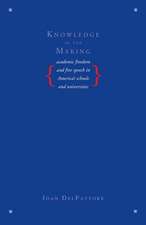Professional Care and Vocation
Autor Timothy W. Winebergen Limba Engleză Hardback – 13 dec 2007
| Toate formatele și edițiile | Preț | Express |
|---|---|---|
| Paperback (1) | 323.03 lei 38-44 zile | |
| Brill – 31 dec 2007 | 323.03 lei 38-44 zile | |
| Hardback (1) | 781.00 lei 38-44 zile | |
| Sense Publishers – 13 dec 2007 | 781.00 lei 38-44 zile |
Preț: 781.00 lei
Preț vechi: 1014.29 lei
-23% Nou
Puncte Express: 1172
Preț estimativ în valută:
149.46€ • 155.15$ • 124.63£
149.46€ • 155.15$ • 124.63£
Carte tipărită la comandă
Livrare economică 18-24 martie
Preluare comenzi: 021 569.72.76
Specificații
ISBN-13: 9789087902995
ISBN-10: 9087902999
Pagini: 184
Dimensiuni: 156 x 234 x 13 mm
Greutate: 0.44 kg
Editura: Sense Publishers
Locul publicării:Netherlands
ISBN-10: 9087902999
Pagini: 184
Dimensiuni: 156 x 234 x 13 mm
Greutate: 0.44 kg
Editura: Sense Publishers
Locul publicării:Netherlands
Notă biografică
Timothy W. Wineberg received his Ph.D in Curriculum Theory in 2006 at Simon Fraser University, British Columbia. His dissertation earned him an award of recognition for excellence in educational research in 2007 by the Canadian Association of Teacher Educators (CATE). He currently lives and teaches in Burnaby, British Columbia.
Descriere
Descriere de la o altă ediție sau format:
This book integrates the traditional understanding of a profession—a calling to selfless service for the public good, through the pursuit of a learned art—with that of vocation—work that offers a deep sense of personal fulfilment, meaning, and identity. Professions are moral endeavours since they require vulnerable individuals to trust in the competence and integrity of someone who professes to care for them. Currently, most versions of professional ethics narrowly focus upon standards of conduct or upon ethical dilemmas. Yet these are rarely compelling enough to change us—they are not morally formative.
This volume takes a different tack to doing ethics. It explicitly targets the moral development of educators. This is crucial because as we develop our sensibilities of perception and qualities of character, we can better interpret practice situations and respond fittingly. Moreover, this approach to ethics seeks to reconceptualize our professional obligation: to embody it in more adequate metaphors, and to revitalize its relational dimension. In this view, our task as educators is to seek out those relational metaphors, images, and narratives of practice which are profound enough to shape our self-perceptions and to fund our moral formation. This book explores five ethical spheres—sacrifice, community, craft, tradition, and moral imagination—and five respective pedagogical images which illuminate the nature of professional care—servant, moral friend, mentor, covenantor, and moral companion. When critically engaged and appropriated, these rich metaphorical images provide clarity, order, and meaning to our perceptions and powerful imperatives for our own moral development.
This book integrates the traditional understanding of a profession—a calling to selfless service for the public good, through the pursuit of a learned art—with that of vocation—work that offers a deep sense of personal fulfilment, meaning, and identity. Professions are moral endeavours since they require vulnerable individuals to trust in the competence and integrity of someone who professes to care for them. Currently, most versions of professional ethics narrowly focus upon standards of conduct or upon ethical dilemmas. Yet these are rarely compelling enough to change us—they are not morally formative.
This volume takes a different tack to doing ethics. It explicitly targets the moral development of educators. This is crucial because as we develop our sensibilities of perception and qualities of character, we can better interpret practice situations and respond fittingly. Moreover, this approach to ethics seeks to reconceptualize our professional obligation: to embody it in more adequate metaphors, and to revitalize its relational dimension. In this view, our task as educators is to seek out those relational metaphors, images, and narratives of practice which are profound enough to shape our self-perceptions and to fund our moral formation. This book explores five ethical spheres—sacrifice, community, craft, tradition, and moral imagination—and five respective pedagogical images which illuminate the nature of professional care—servant, moral friend, mentor, covenantor, and moral companion. When critically engaged and appropriated, these rich metaphorical images provide clarity, order, and meaning to our perceptions and powerful imperatives for our own moral development.












